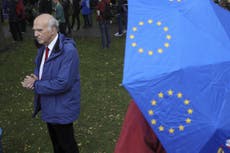I want a 'people's vote' referendum on Brexit because we were lied to during the last campaign
Monday, 1 January 1973 – the day we joined the European Economic Community – was one of the best days of my life
Since the 2016 referendum there has been a concerted effort by many, including in government, to shut down debate about Brexit and to tell us we should simply trust ministers to get on with it. They say Brexit is an irreversible process, and that we shouldn’t worry about the cost and complexity of following through with it, or the litany of broken promises.
Today we are saying that’s not good enough. Our country’s future is at stake and we will not stand idly by. If we leave the EU, Brexit will shape the country’s future for decades to come. That is why I support a people’s vote on the final deal.
Monday, 1 January 1973 was one of the best days of my life. I was working with The Royal Shakespeare Company, my wife and I owned a tiny cottage in Warwickshire, we had a young son, and a daughter on the way, and I had a second-hand Ford Prefect. But the reason for joy on that New Year’s Day was that the UK had finally become a member of the European Economic Community.
I grew up in a working class home in the industrial West Riding of Yorkshire. My father worked at a local chemical plant and my mother worked in a heavy woollen weaving shed, surrounded by noise, polluted air and high risk. But she loved the social atmosphere: there was friendship, laughter, companionship and trust. My father had been a regular soldier but his post-war working life was never as good as it had been during his years of service. He loved that job for the same reason my mother loved hers – a sense of community.
I was born in July 1940 but, of course, the war did not affect me directly. It seemed I didn’t have a father, but I was well cared for.
But the years after the war were very different: shortages of everything, rationing and the black market. Little by little, I learned what the war had meant to the adults around me. There was the loss of loved ones, and severely injured family and friends returning home to a very challenging life. Servicemen, like my father, suffered from shell-shock, or post-traumatic stress disorder, as we now call it, with no medical care to help them. The cost of war was everywhere and many never recovered from it. That was the Europe I grew up in and that is why, when Britain joined the EEC in January 1973, that date was so special for me.
The EEC stated that its main aim was to “preserve peace and liberty” and to “lay the foundations of an ever-closer union among the peoples of Europe”. Its border stretched from north-west Germany to the toe of Italy and included most of the territory of Europe over which war had twice raged, only 22 years apart. When the UK and Ireland were brought in as members I felt, for the first time in my life, that the brutality of the two world wars could never happen again and, at last, cooperation would assure benefits for everyone.
Perhaps I had too utopian a vision of what a new Europe might be like. The Balkans war of the 1990s was a ghastly setback. Nevertheless, the term “European” had come to mean something different and I was proud to describe myself and my family as British and European citizens. On the front of all our passports the first words are “European Union” and then “United Kingdom of Great Britain and Northern Ireland”. Brexit will erase those first two words and I will offer my new blue passport to immigration officials around the world with less pride than I now do.
The first time I was back on the continent after the 2016 referendum, on the busy, colourful streets of Ghent and Bruges, I felt distinctly uncomfortable. I almost felt shame, now that my country was seeking to unravel all that had been achieved. Especially that the Brexit campaigners had deceived the British people with their false and deliberately misleading slogans and speeches – £350m a week promised to the National Health Service. Where is the £350m now, with our emergency rooms, hospitals and surgeries in the grip of a crisis unlike anything the NHS has ever experienced?
The cold reality is that Brexit is hurting our economy, our public services and the life chances of future generations. And the government has already admitted that in all of the possible outcomes of the current negotiations, the country will be worse off.
Brexit is such a huge and momentous time in our history, one that will affect future generations for many years to come and it should not be left simply to politicians.
So, now that we are learning the real cost of Brexit, I want to urge that we think again and insist that the decision about whether to accept the Brexit deal is a matter for the people. To my mind the only way to resolve the huge challenge we now face as a country is through a people’s vote.
Sir Patrick Stewart OBE is a leading supporter of the People’s Vote campaign



Join our commenting forum
Join thought-provoking conversations, follow other Independent readers and see their replies